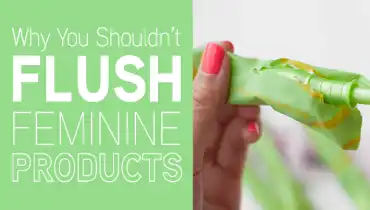
Attention, ladies! This public service announcement is for you: don’t flush feminine products down the toilet. In defiance of this advice, you might declare, “What? But tampons say they’re flushable right on the box!” However, once you realize how tampons, maxi pads, wipes, and other “flush-friendly” products affect your plumbing system or septic tank, you’ll think twice about ever flushing them again.
How Can Feminine Products Damage Your Plumbing System?
Have you ever noticed a sign in the ladies’ room urging you not to flush feminine products? Those little trashcans by the toilet or mounted to the wall aren’t just for decoration—they’re to accommodate the proper disposal of feminine products, which should never go down the toilet. Here’s why:
On average, tampons grow 10 times their size once they have absorbed fluid. This makes them prime for clogging sewer drains, especially in older systems where roots have started growing into the pipes.
Tampons never break down. This means, unlike toilet paper, if one gets caught on something on its way down the drain, it doesn’t dissolve. In fact, the tampon will linger in the pipe and allow other debris to build up around it until you call a plumber to clear the obstruction.
Even if your flushed feminine products make it out of your plumbing system, it’s not in the clear yet. It could cause a blockage further down the line, creating plumbing problems for the people living next door. That’s one surefire way to make your neighbors hate you!
When tampons make it all the way to the sewage treatment plant, which plenty of them do, the pumping station uses chemical or physical filter systems to break them down along with other non-degradable items that end up in the sewer. This is time-consuming and expensive, contributing about $46 billion to America’s public wastewater treatment process each year. Once screened out, non-degradable items are sent to the landfill—where they would have ended up anyway had you just thrown them away, without all the extra cost and risk to your plumbing system!
Tampons are damaging to septic systems, too. Since they never degrade, they take up space in the tank, raising liquid levels and allowing solids to block distribution tubes. Eventually, water may back up into your home or collect around the tank, at which point you know it’s time to call the plumber.
Other Products You Should Never Flush
Make it a rule in your house never to flush anything but human waste and toilet paper. That’s it. No exceptions, even if the word “flushable” is printed right on the box. After all, for some manufacturers, “flushable” simply means the product is small enough to disappear down the toilet drain when you flush. But with this logic, anything smaller than a golf ball is “flushable.”
As a reminder, here are some other commonly flushed items that should never go down the toilet:
- Any paper product other than toilet paper, including facial tissues, napkins, and paper towels
- Cotton balls and swabs
- Dental floss
- Baby wipes
- Adhesive bandages
- Condoms
- Medicine or drugs
- Cigarette butts
- Diapers
- Kitty litter and pet poop
- Fat, oil, and grease
- Drain cleaning chemicals
Accidentally Flushed a Tampon Down the Toilet?
Don’t panic—keep an eye on your plumbing and watch for signs of a blockage, such as slow drains, sluggish flushing, or gurgling pipes. If you notice these problems, it’s time to call a plumber.
Mr. Rooter Plumbing is the right plumbing company for the job. We clear drains, unclog toilets, repair septic systems, and much more. Give us a call today.

